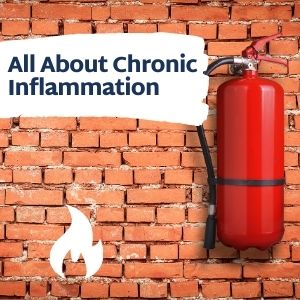
All About Chronic Inflammation
Share
If you are a regular reader of Dr. D’s blogs or a social media follower (we thank you!), you may notice that we discuss inflammation A LOT. That is because the role it plays in your overall health and well-being cannot be understated.
It is now widely accepted that chronic inflammation is the root of all disease. But what exactly is inflammation?
Inflammation is the immune system’s normal response to injury, toxins or infection. It is a defence mechanism, when all is well. Short-term, or acute, inflammation is beneficial when it is under control, however, inflammation that persists longer is known as chronic inflammation. What we are exposed to in our modern lifestyle and our choices like smoking, a high intake of processed foods, chronic stress, alcohol, and environmental pollutants actually increase the systemic inflammation in our bodies as these are all sources of toxins that our immune system continually tries to fight off.
Chronic, persistent or long-term inflammation lasts for periods of months to years. Generally, the extent of chronic inflammation can vary, but it may lead to things like tissue destruction and scarring, reshaping of healthy or normal tissue, changes in gene expression, and much more. Briefly put, it leads to disease.
Chronic Inflammation: Risk Factors
- Aging: Increasing age is correlated with elevated levels of several inflammatory molecules, possibly because of free radical (unstable molecules that damage the cells) accumulation and an increase in body fat.
- Alcohol: Chronic alcohol use impairs gut and liver functions and can lead to systemic inflammation.
- Poor Diet: Saturated fat, trans-fats, processed foods and refined sugar are associated with inflammation in the body.
- Obesity: Many studies have shown that fat tissue actually secretes inflammatory cells.
- Stress: Both physical and emotional stress is associated with a rise in inflammatory molecules. Stress can also lead to sleep problems.
- Sleep Disorders: People with irregular sleep schedules are more likely to have chronic inflammation than regular sleepers.
- Cigarette Smoking: This may lower the production of anti-inflammatory cells in the body and therefore, allow inflammation to ensue more easily.
Studies show that the most common signs and symptoms of chronic inflammation include:
- Pain
- Chronic fatigue and insomnia
- Depression, anxiety and mood disorders
- Gastrointestinal issues like constipation, diarrhea, and acid reflux
- Weight gain or weight loss
- Frequent infections
Some other symptoms may include: rashes, fevers, mouth sores.
There is no such thing as a diagnosis of “Chronic Inflammation”
Although your body may be dealing with slow, persistent inflammation, it by itself is hard to determine/confirm and is only diagnosed when it occurs in conjunction with another medical condition. If you are concerned about inflammation, it is best to speak with your medical doctor, however, there are lifestyle changes you can make to help your body control it.
Ways to help remove and reduce inflammation:
- Weight loss is one of the most important things you can do to manage inflammation.
- A low-glycemic diet, meaning, limiting foods like soda, refined carbs, fructose corn syrup as they have all been linked to promoting inflammation.
- Reducing your intake of saturated and trans fats. This may not come as a surprise to you. Processed foods are usually high in these fats, and are definitely pro-inflammatory.
- Increase your intake of fruits and vegetables. Again, this may not come as a surprise. Vegetables and fruits are high in antioxidants and other anti-inflammatory properties.
- Increase your intake of fiber as it is associated with lowering inflammatory molecules.
- Sip some green and black tea. Special nutrients in tea (called polyphenols) are associated with a reduction in CRP, a specific inflammatory marker in the blood.
- Add Omega-3s to your diet. A higher intake of omega-3 fatty acids is associated with lowering levels of inflammatory markers.
- Spice up your meals with turmeric or add a daily full-spectrum turmeric to your health regimen. Research suggests that it can help in the management of inflammatory conditions, metabolic syndrome, arthritis, anxiety, high cholesterol and much more.
- Micronutrients: Magnesium, vitamin D, vitamin E, zinc and selenium all possess anti-inflammatory properties.
- Exercise: In addition to helping with weight loss, exercise has also been shown to lower inflammation in the body in general.
Check out our shop as we already got you covered with your daily supply of Omega-3’s in Dr. D’s Pure Hemp Seed Oil (now available in a natural orange flavour) and our revolutionary Dr. D’s Ultra BioTurmeric!